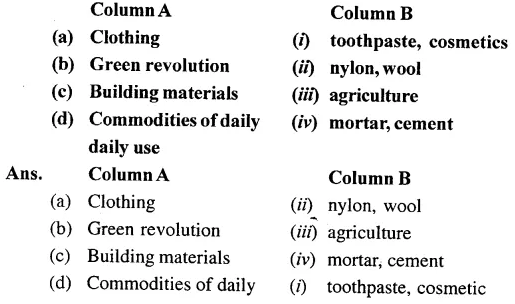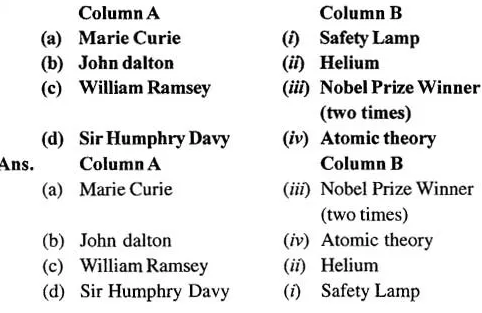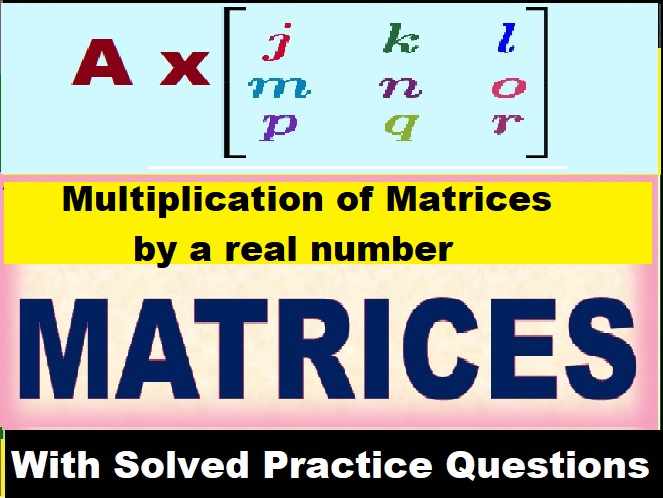Introduction Chemistry ICSE Class-6th Concise Selina Chemistry Solutions Chapter-1. We Provide Step by Step Answer of Objective, True False , Fill in the blanks , Match the following , Short/Long Answer Type of Exercise-1 Introduction To Chemistry . Visit official Website CISCE for detail information about ICSE Board Class-6.
Introduction To Chemistry ICSE Class-6th Concise Selina Solutions
Exercise
Question 1.
Give two examples for each of the following substances :
(a) food preservatives
(b) fuel
(c) fungicides
(d) medicines
(e) building materials
(f) chemical war weapons
Answer:
Two examples of :
(a) Food preservatives :
- Sodium Benzoate
- Sodium metabisulphate
- Sugar
- Common salt
(b) Fuel:
- L.P.G.
- Petrol
- Coal
(c) Fungicides :
- Sulphur
- Bordeaux mixture
(d) Medicines :
- Penicillin
- Painkillers
- Antibiotics
(e) Building materials :
- Cement
- Steel
- Glass
(f) Chemical war weapons :
- TNT
- RDX
Question 2.
Give short answers :
(a) What is science ?
(b) What is chemistry ?
(c) What is a fuel ?
(d) How is chemistry helpful in improving the health of human beings ?
(e) What is alchemy?
(f) What kind of experiments did Alchemists do?
(g) What is ‘Philosopher’s stone’ ?
(h) What is the main difference between alchemy and chemistry?
(i) Name the chemicals which help in increasing food production.
(j) Name six such products, which we use daily.
(k) How is the knowledge of chemistry important to mankind ?
Answer:
(a) SCIENCE is the systematic effort by human beings to control nature through experiments and observation for their own use.
OR
SCIENCE is the systematic ongoing effort by human beings to study understand and utilise nature for meaningful purposes. This understanding is slowly developed by careful observations and experiment.
(b) Chemistry :
“The branch of science that deals with the study of the composition and the physical and chemical properties of various forms of matter is called Chemistry.”
(c) Fuels :
The substances which on burning produce heat energy are called fuels.
(d)
Chemistry is very helpful in improving the health of human beings by providing Antibiotics, Pain killers, Pencilin, Tetracycline etc. It has provided us with Vitamins, Enzymes, Minerals and Anesthesia (chloroform, formalene etc.)
(e)
The word “Alchemy” has its origin in a Greek word ‘Khemeia’ means “art of transmuting metals”. It was partly based on experimentations and partly on spiritual discipline.
(f)
‘Alchemists’ considered to be early chemists. They used all general techniques of chemistry in healing humans. Their contribution proved valuable to the society and in the advancement of civilization.
They had contributed to an incredible number of future uses of chemicals, metals, ink, paints, cosmetic, medicines, porcelain, etc.
(g)
The goal of alchemy was to find a mythical and magical substance called “philosopher’s stone” not a literal stone but wax, liquid or powder with magical power, which on heating with a base, iron and copper metals would turn into gold, the purest form of matter which would bring wealth, health and immortality.
(h)
Alchemy was both scientific and spiritual. Alchemists never separated them. It also lacked a common language for its concepts and processes i.e. there was no standardized scientific practice.
Chemistry was completely separated from ancient traditional alchemy. Still modern chemistry in general owes a great deal to alchemy. Alloys are formed by mixing metals with other metals and substances.
(i)
Chemicals which help in increasing food production are fertilisers like urea, sodium nitrate, potash, ammonium phosphate, calcium nitrate etc. Pesticides like aldrin, malathion which are used to kill pests. Insecticides like D.D.T., B.H.C. fungicides like sulphur, bordeaux mixture etc.
(j)
Six products of daily use are soap, paints, pen, tooth-paste, cooking oil, potable water.
(k)
Importance of chemistry to mankind chemistry plays an important role to provide us with things of daily use like toothpaste, soap, detergents, paints, clothes,
medicines, fertilisers, pesticides, plastics, in preparing fuels, consumer products like glass, paper, pencils, pens, in substances used in defence like gunpowder, T.N.T. etc.
Question 3.
What is the contribution of chemistry in the following fields ?
(a) Industry
(b) Clothings
(c) Cosmetics
(d) National Defence
(e) Medicines
Answer:
Contribution of chemistry in the field of :
(a) Industry :
To improve efficiency and production of metals, paints, paper, plastics, alloys, textile, pharmaceuticals, electroplating, cosmetics, synthetic fibres etc.
(b) Clothings:
Chemistry is widely used in textile industry which manufactures clothing for us. Clothes guard our body from external environment.
Formation of clothing begins with the knowledge of conversion of fibres into fabrics. Fibres can be natural or synthetic. Earlier only natural fibres were known to man such as cotton, jute, silk, wool, etc. which were used to produce dress materials, sarees, bags, sweaters, shawls, etc. With more development, synthetic fibres were also made such as nylon, terylene etc.
These fibres are strong, wrinkle resistant and dry quickly. They are used to make towels, bed sheets, bags, curtains, carpets, blankets, dress materials, etc.
(c) Cosmetics:
The use of talcum powder, skincare creams, lipsticks, eyes and facial make up, deodorants, lotions, perfumes, bathing oil, body butter, baby products, etc. It is possible to convert various ingredients into usable cosmetics due to knowledge of chemistry.
(d) National Defence :
Substances like gunpowder, T.N.T. (trinitrotoluene), phosgene, chemical weapons, laughing gas, etc., are all products of chemistry which contribute to the national defence.
(e) Medicines :
Extensive researches by chemists have led to the discovery of number of medicinal drugs. These drugs help in fighting diseases and have thus increased the life span of human beings.
Examples : Aspirin, paracetamol, antibiotics like penicillin, tetracyline, antiseptics and various other medicines used to kill germs and cure diseases and their symptoms.
Question 4.
Who is known as Father of chemistry? Why?
Answer:
Robert William Boyle is known as ‘Father of Modern Chemistry’. He was an Anglo Irish scientist born in Ireland. He was the first to perform experiments under controlled conditions and publish his researches with elaborate details of procedure, apparatus and observations. Robert Boyle put chemistry on a firm scientific footing transforming it from alchemy into one based on measurements. He defined elements, compounds and mixtures.
Question 5.
Name the scientists who discovered the following.
(a) Atoms
(b) Oxygen
(c) Safety lamp
(d) Elements
Answer:
The scientists who discovered
(a) Atoms : John Dalton was a British chemist and physicist. He proved that matter consists of small indivisble called ‘atoms’. For this he proposed the atomic theory which was later on called “Dalton’s atomic theory”.
(b) Oxygen : Joseph Priestly.
(c) Safety lamp : Sir Humphry Davy.
(d) Elements : Antoiene Lavoisier was a French nobleman. He revolutionized chemistry. Lavoisier named the elements carbon, hydrogen and oxygen and discovered the role of oxygen in combustion and respiration for which he is most noted. He established that water is a compound and helped to continue the transformation of chemistry from a qualitative science to a quantitative one.
Objective Type Questions of Introduction To Chemistry ICSE Class-6th
Question 1.
Fill in the blanks :
(a) Chemistry deals with the study of matter and the changes it undergoes.
(b) Fertilizers help to increase the production of food.
(c) Food items like jams and pickles are protected by using preservatives (salt and sugar).
(d) L.P.G. is used for fuel.
(e) Inert gases were discovered by William Ramsay.
Question 2.
Match the following words in column A with those in column B:

Question 3.
Write “True” or “False” against each of the following statements.
(a) Chemistry plays an important role in national economy: True
(b) Antibiotics are used as preservatives : False
(c) D.D.T. is an important fertiliser: False
(d) Gunpowder is an ……ticide : False
(e) Enzymes secreted by our body are chemicals : True
Question 4.
Choose the correct alternative from the choices given below for the following statements :
(a) Trinitrotoluene is used as
- a preservative
- a fertiliser
- a fuel
- an explosive
Answer
an explosive
(b) Which one of the following is a pesticide ?
- benzoic acid
- aldrin
- sugar
- gunpowder
Answer
aldrin
(c) Mortar is used as a
- plastic material Urea is an
- a building material
- an insecticide
- as medicine
Answer
a building material
(d) Used is an important
- uel
- preservative
- fertilizer
- food item
Answer
fertilizer
(e) The chemicals prescribed by a doctor in treatment of infectious diseases are called
- antigens
- lotions
- antibiotics
- creams
Answer
antibiotics
Question 5.
Match the following scientists in column A with their discoveries or contributions in column B.

–: End of Introduction To Chemistry ICSE Class-6th Solutions :–
Return To ICSE Class – 6 Concise Selina Chemistry Solution
Thanks


